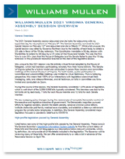Williams Mullen 2021 Virginia General Assembly Session Overview
General Overview
The 2021 General Assembly session adjourned sine die (Latin for adjourning with no appointed day for resumption) on February 8th. The General Assembly convened its 2021 Special Session on February 10th and adjourned sine die on March 1st. While a bit unusual, this special session was called by Governor Northam due to the inability of each body to obtain a 2/3 vote in favor of the 15-day extension. The Constitution mandates a 30-day session with the abilities to extend to 46 days by a 2/3 votes of the House and Senate. This was the first time in over 20+ years that the House of Delegates and the Senate failed to pass the 15-day extension in the procedural resolution enacted at the start of the legislative session. All legislation was finalized on April 7th at the reconvened session to address the Governor’s amendments and vetoes (there were no vetoes this year) on legislation passed in the 2021 General Assembly Session.
Also unique to the 2021 session was the entirely virtual format adopted by the House of Delegates, which had members participating remotely from their home districts. The Senate of Virginia opted for a hybrid model and conducted in-person floor sessions and committee meetings at the Science Museum of Virginia. For both bodies, public participation in committee and subcommittee meetings was limited to virtual testimony. From a lobbying perspective, this meant that 100% of our interactions with legislators were virtual (text messaging, calls, and videoconferences), and all testimony on bills in committee was time limited and conducted via Zoom.
During the course of the session, the General Assembly considered 1,476 pieces of legislation, which is well short of the 2,000-3,000 bills typically considered. This decrease was due to the bill limits set by each body, 7 bills for each House member and 12 bills for each Senate member.
We saw sweeping policy changes during this second year of complete Democratic control of the executive and legislative branches of government. The Democratic majorities pursued efforts to legalize cannabis, abolish the death penalty, advance criminal justice reform, institute statewide paid family medical leave mandates, and establish a state-run retirement program for private sector employees. In addition, the General Assembly considered major legislation focused on pandemic relief due to COVID-19.
High-profile legislation passed by General Assembly
Listed below are some of the high-profile bills passed by the General Assembly. Please consult the General Assembly’s Legislative Information System website to find the current status of these bills and the actual bill language, as our descriptions below are just summaries, which, by definition, do not provide all of the details included in the legislation.
Legalization of Cannabis/ Marijuana: (HB 2312; SB 1406) After difficult and tense negotiations between the House and Senate, Virginia legislators took a step toward the legalization of the possession and legal sale of marijuana. The legislation contains a reenactment clause requiring that it pass again in the next General Assembly session before becoming effective. The original effective date was January 1, 2024, however, during the reconvened session, the House and Senate accepted the Governor’s amendment to move up the date to July 1, 2021. In addition, individuals over the age of 21 will be allowed to grow up to four cannabis (marijuana) plants at their residence for personal use. The Governor’s amendments, which allowed for possession of up to 1 oz as of July 1, 2021, but not creating any way to legally purchase marijuana until January 1, 2024, were highly contentious. The amendments passed the House on a party line vote; however, the Senate’s vote was split 20 – 20, with the Lt. Governor casting the tie breaking vote in favor of the amendments. Based on testimony during the debate, we expect further amendments will be proposed when it is introduced again in advance of the 2022 session. The bill establishes a new authority, the Virginia Cannabis Control Authority, establishes criteria for licenses (including social equity licenses), creates five types of licenses that will govern cultivation, manufacturing, testing, wholesale and retail sale. The bill also establishes a tax structure and directs revenue (well over $100 million estimated) to various initiatives, which include Pre-K programs, disadvantaged communities, substance abuse treatment and public health. While preliminary work on the regulatory structure will begin this summer, the legal sale (if reenacted in 2022) and possession of marijuana will not take place until January 1, 2024.
Death Penalty: (HB 2263, SB 1165) Virginia became the 23rd state (and first southern state) to abolish the death penalty. The bill also requires that anyone over the age of 18 who is currently sentenced to death shall instead be sentenced to life in prison with no chance for parole or conditional release.
Mandated Paid Sick Leave: (HB 2137) As introduced, the bill would have required all employers of essential workers, as defined in the bill, to provide any employee who worked an average of 20 hours a week or 90 hours a month, one hour of paid sick leave for every 30 hours worked. Paid sick leave could be used by the employee for their own sickness or to care for a sick family member. The bill’s scope was dramatically narrowed through the legislative process, and now, only requires the state to provide paid sick leave to consumer-directed personal care attendants who are employed by Medicaid beneficiaries and reimbursed by Virginia’s Medicaid program.
Legislation related to pandemic relief: Numerous bills and budget amendments passed both bodies. Of note, HB 2333 makes it easier for health care providers to distribute vaccinations as volunteers. An amendment was added to HB 2333 to encourage data submission of racial and ethnic information on the individuals who receive the vaccination. Both have an emergency clause allowing them to go into effect as soon as Governor Northam signs them. The General Assembly also passed legislation to allow health care providers and first responders to claim workers’ compensation for contracting COVID-19 on the job.
Tax Conformity and PPP Loan Deductibility: Virginia is one of the few states that retroactively conforms its tax code to federal changes from the preceding tax year, and legislation to make that happen is often non-controversial. For the 2020 tax year, however, the General Assembly had to weigh whether to allow businesses that received PPP loans to deduct expenses paid with the loans. The Senate and House passed competing proposals with the House limiting expense deductions to $25,000 for pass-through entities and the Senate version allowing deduction of expenses for all corporate entities up to $100,000. After a significant push from the business community and the Virginia Society of CPAs, the General Assembly ultimately agreed on the Senate position.
State-Run Retirement for Private Sector Employees: Delegate Luke Torian, Chairman of the House Appropriations Committee, helped successfully pass legislation that would establish a state-run retirement program, the Virginia Saves Program, that provides Individual Retirement Accounts (“IRA”) for private sector employees. The bill states that a nonprofit or for-profit employer that employs 25 or more full-time employees and that has employed individuals for two years prior to July 1, 2021, must enroll employees in the program by the timeline established by the governing board of the Virginia College Savings Plan (Virginia 529 Board), if such employer does not offer retirement saving options to the employees. Employees may choose to opt out of the program, and employers who already offer qualifying retirement plans for their employees would not have to participate. The details of the program will be developed and administered by Virginia 529 and funded through a 5% employee payroll deduction. Employers who do not comply with the law are subject to a $200 per employee annual fine. The bill also contains language stating that the Board shall convene a workgroup of stakeholders to make recommendations to clarify the scope of the state-facilitated IRA savings program, to examine the experience of other states that have enacted similar legislation, and to assess potential incentives to encourage participation in the Program and defray the costs of participation for small businesses. A report is due back to the General Assembly in October 2021.
Significant Bills from the 2021 Session
Additional, high-profile legislation for this session included the passage of the following:
- Local public schools required to offer in-person learning.
- Get Skilled, Get a Job, Give Back (G3) Fund and Program establishment for Virginia Community College System.
- Clean cars bill that allows the State Air Pollution Control Board to adopt California’s low-emission vehicle standards as well as zero-emission vehicle standards that set binding targets for electric vehicle sales.
- A system of cash rebates for the purchase of electric vehicles. (Note: While the system was set up, no money was budgeted for it.)
- Amended the Virginia Freedom of Information Act requiring mandatory release of criminal incident information in cases that are not ongoing.
- Consumer Data Protection Act will establish framework for controlling and processing personal data and will go into effect Jan. 1, 2023.
- Expansion of the Virginia Court of Appeals from 11 to 17.
- Department of Environmental Quality will promulgate and implement regulations for small renewable energy projects that include storage facility components.
- A temporary suspension of gun rights for individuals with a domestic assault conviction against certain family members.
- Development of the Virginia Health Reinsurance Program to reduce the cost of insurance offered through the individual market.
- Amends the housing protections on foreclosure, increases the notice period for a foreclosure sale from 14 to 60 days and requires such notice to provide the grantor with information regarding housing counseling.
Many bills, as always, failed to pass. Among these were the following:
- Right to Work Repeal (e.g. the repeal of the law that says no person can be compelled to join a union in order to work in Virginia) and a bill called “Fair Share” that basically was the repeal of “Right to Work” by another name.
- Ending qualified immunity for law enforcement.
- Campaign finance reform banning campaign contributions by corporations and major donors.
- Electric utility rate reform efforts.
- Essential workers hazard pay requirement when a shelter-in-place or stay-at-home order is in effect.
- Electronic execution of estate planning documents.
- Cost-sharing payments for prescription asthma inhalers.
- Transparency in the redistricting process for the Virginia Redistricting Commission.
- Legislation to reform sections of Virginia’s “Fair Business Practice Act” regulating how health care providers and insurers contract with one another.
- Legislation to increase Virginia’s existing Medical Malpractice Cap.
- Allowing class action lawsuits in Virginia.
- SWAM Procurement bill, would have established a Small Business Procurement Enhancement Program with a statewide goal of 42% of certified small business utilization.
- Paid Family Medical Leave, a mandate for private sector paid family medical leave plans.
- Requirement for employers to pay essential workers hazard pay and provide personal protective equipment. Violators would be subject to the same civil penalties as failing to pay wages generally.
- Uninsured and underinsured motorist insurance policies provided that, if an uninsured or underinsured motorist insurance policy representative refused a plaintiff's reasonable settlement demand in bad faith, the insured could have been awarded the full amount of the judgment, attorney fees, and costs.
If past is prologue, you can expect to see many of these failed bills get reintroduced next year.
Virginia’s 2020-2022 Biennial Budget
In addition to dispensing with 98 bills, the General Assembly also worked through amendments to the Commonwealth’s biennial budget. Throughout the pandemic, Virginia has fared better than most states and has balanced its budget through deferrals to the rainy-day fund and cutting one-time discretionary spending. As the General Assembly approached the 2021 session, new revenue forecasts showed continued growth in revenue over what was forecasted. By mid-February, new revenue forecasts added an additional $730 million to the current biennial budget. The state also received additional federal COVID-19 relief funding in late December. The General Assembly used these federal funds for expenses that would have previously required to be covered by state general funds. Armed with new revenue forecasts, budget conferees added a 5% pay raise for teachers, state employees, and state supported local employees, as well as pay raises for state law enforcement officers. The General Assembly will also deposit an additional $250 million in the cash reserve fund, which is in addition to the $650 million that the Governor had already included in his budget amendments. The Governor proposed 18 amendments to the budget bill, HB 1800, most of which were technical amendments and only increased spending by $6.3 million. The General Assembly supported all of the amendments. A summary of the amendments can be found here - Governor's Budget Amendments.
Of note, the budget does include language that explicitly requires that the General Assembly must approve expenditures of federal funding the state receives. A Special Session will likely be called in the summer of 2021 for the legislature to appropriate federal funding.
Conclusion
Do not rely on this summary for the details of any bill. You can review the exact text of any bill by going to the Virginia Legislative Information System site: http://leg1.state.va.us/ or contact a member of the Virginia Government Relations team who can answer any questions or provide additional details if needed.
Click here or on the image below for a printer friendly version.





